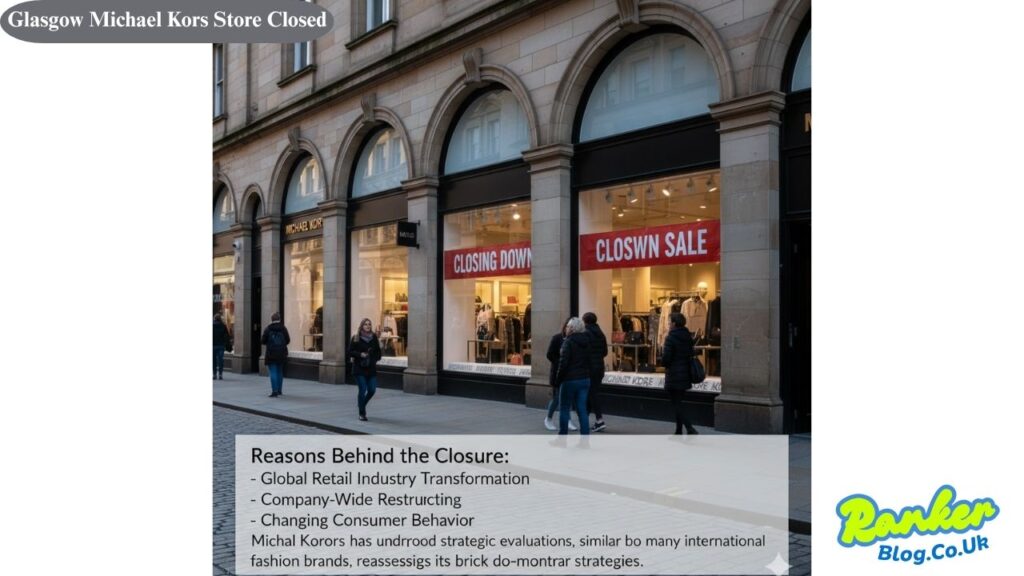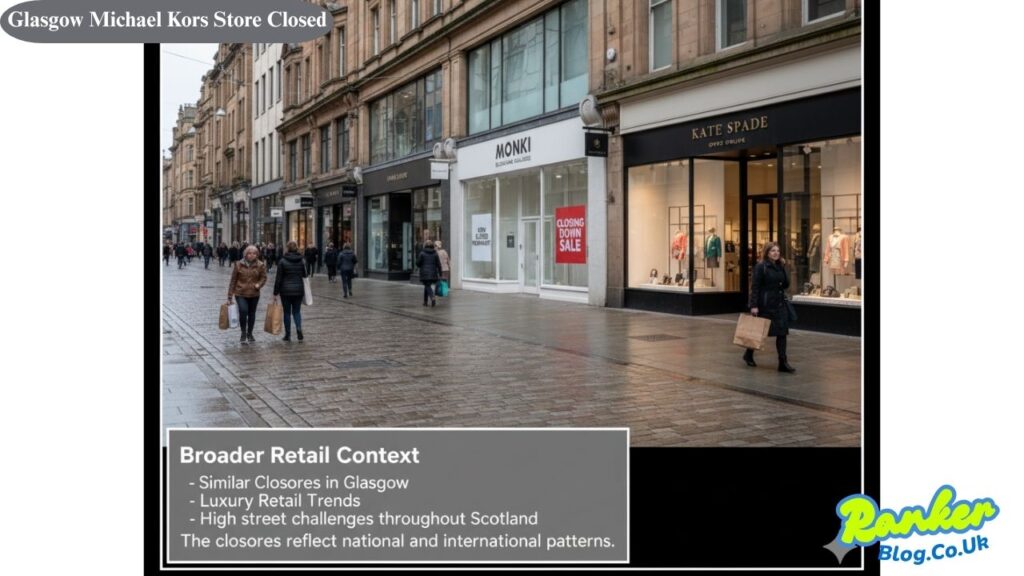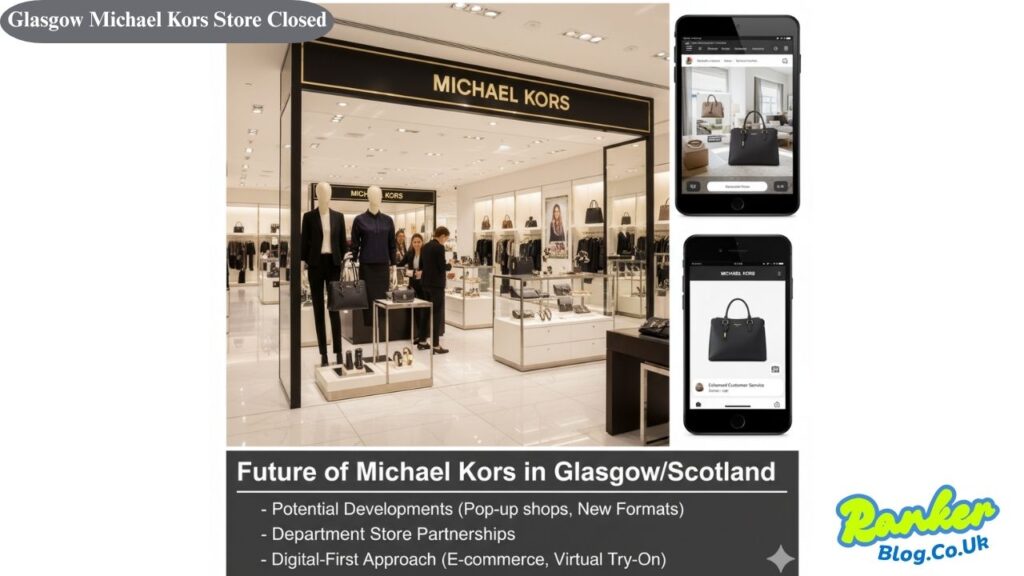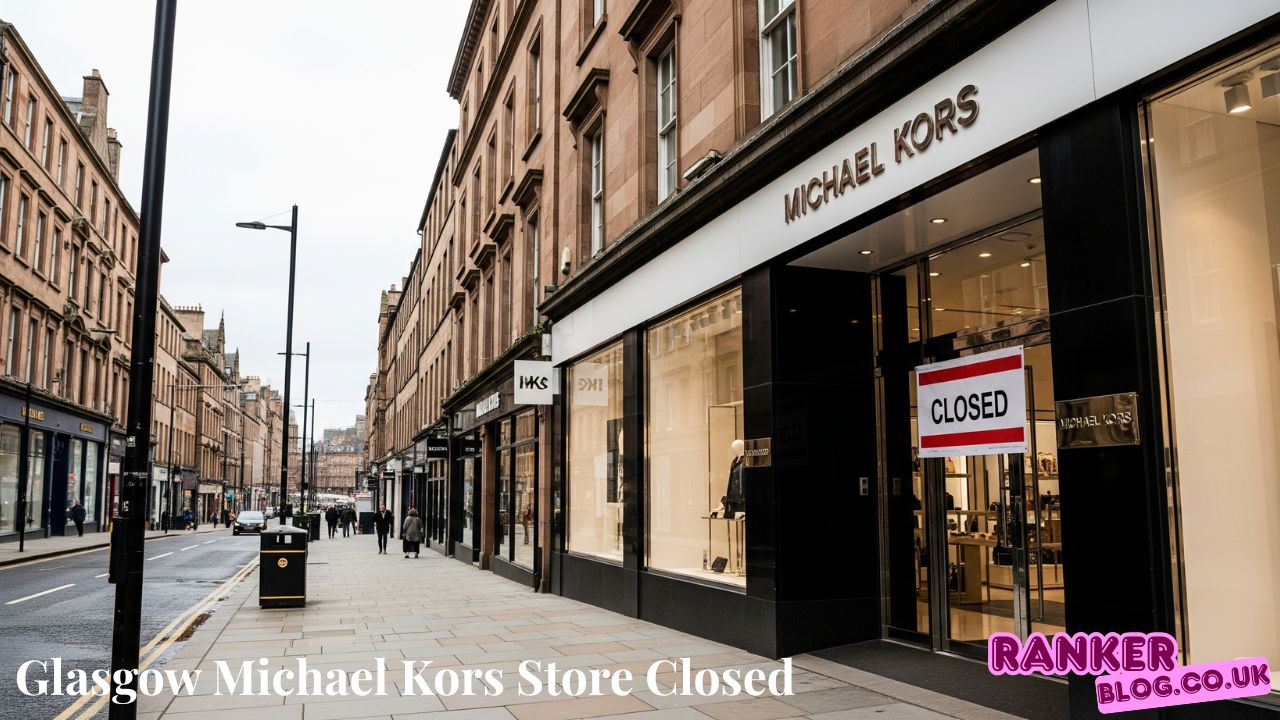Introduction
Michael Kors has long been recognized as a premier luxury fashion brand, offering sophisticated handbags, accessories, and ready-to-wear collections that appeal to style-conscious shoppers worldwide. However, recent changes in the retail landscape have left many Glasgow residents surprised and disappointed. The Glasgow Michael Kors store closed, marking a significant shift in the city’s luxury shopping scene.
This closure affects not only loyal customers who enjoyed browsing the latest collections in person but also reflects broader challenges facing physical retail stores in Scotland’s vibrant commercial districts. Understanding what led to this decision and what options remain available can help shoppers navigate this new reality.
Details of the Closure
The Michael Kors Glasgow store closed its doors, leaving a noticeable gap in the city’s premium fashion offerings. While the brand maintained a presence in Glasgow’s bustling shopping areas, the decision to close came as part of evolving retail strategies that many fashion houses are implementing across the United Kingdom.
The exact circumstances surrounding when the store ceased operations have varied depending on location specifics, but the impact on local shoppers has been immediate. Those who previously relied on the physical store for trying on accessories, examining leather quality, or experiencing the brand’s signature aesthetic firsthand now face limited options within the city center.
Official communications from the brand regarding Glasgow’s retail presence have indicated a shift in how they serve Scottish customers, though specific details about whether this represents a permanent closure or potential future developments remain somewhat unclear.
Reasons Behind the Closure

Several factors likely contributed to the decision behind the closure. The global retail industry has experienced a dramatic transformation in recent years, with luxury brands reassessing their brick-and-mortar strategies across multiple markets.
Company-Wide Restructuring
Like many international fashion brands, Michael Kors has undergone strategic evaluations of its store portfolio. This often involves closing underperforming locations or consolidating presence in areas where multiple stores exist within close proximity. Such restructuring helps brands optimize operational costs while maintaining market presence through alternative channels.
Digital Transformation
The accelerated shift toward e-commerce has fundamentally changed how consumers shop for luxury goods. Online platforms offer convenience, a broader selection, and often competitive pricing that physical stores struggle to match. This digital migration has prompted many brands to reduce physical footprints while investing heavily in their online infrastructure.
Changing Consumer Behavior
Post-pandemic shopping habits have evolved considerably, with more customers comfortable making significant purchases online without trying items in person first. This behavioral shift has particularly impacted accessories and handbag retailers, where Michael Kors holds a significant market share.
Economic Pressures
Operating retail spaces in prime Glasgow locations comes with substantial overhead costs, including rent, staffing, and inventory management. When foot traffic declines or sales don’t meet projections, maintaining these spaces becomes financially challenging.
Impact on Glasgow Shoppers
The closure has created inconvenience for Glasgow residents who appreciated the hands-on shopping experience. Luxury accessories often require personal inspection—feeling the leather quality, checking hardware details, and ensuring the perfect size and fit. Without a dedicated store, these experiences become more difficult to replicate.
Alternative Shopping Options
Fortunately, several alternatives exist for those seeking Michael Kors Glasgow shopping experiences:
Department store concessions within Glasgow may still carry Michael Kors products, offering some level of physical shopping availability. These sections typically feature curated selections of popular items, though they may not match the comprehensive range of a standalone store.
The brand’s official website provides the full product catalog, detailed descriptions, high-quality imagery, and customer reviews that help inform purchasing decisions. Online shopping also offers the convenience of home delivery and straightforward return policies.
Nearby Locations
For those willing to travel, checking whether Michael Kors maintains stores in Edinburgh or other Scottish cities could provide access to the complete in-store experience. Some shoppers find that combining a day trip with retail therapy makes the journey worthwhile.
Broader Retail Context

The Michael Kors Glasgow store closed situation isn’t isolated—it’s part of a wider pattern affecting Glasgow’s retail landscape and luxury shopping throughout Scotland.
Similar Closures in Glasgow
Other fashion retailers have also made difficult decisions about their Glasgow presence. The Monki Glasgow Buchanan Galleries closure exemplifies how even popular brands are reevaluating their physical retail strategies in the city. Buchanan Galleries, once a thriving shopping destination, has seen multiple departures as retailers adapt to new market realities.
Additionally, the Timberland Glasgow store closure demonstrates that this trend extends beyond luxury accessories into footwear and lifestyle brands. These closures collectively signal shifting dynamics in how brands connect with Scottish consumers.
Luxury Retail Trends
The Kate Spade Glasgow presence and similar brands face comparable challenges as consumer preferences evolve. Luxury and premium brands must balance maintaining aspirational in-store experiences with the economic realities of operating expensive retail spaces in an increasingly digital marketplace.
High street challenges throughout Scotland reflect national and international patterns where traditional retail models face pressure from multiple directions—online competition, changing consumer habits, economic uncertainty, and rising operational costs all contribute to difficult strategic decisions.
Future of Michael Kors in Glasgow/Scotland

While the current store closure represents a setback for Glasgow shoppers, it doesn’t necessarily mean Michael Kors has abandoned the Scottish market entirely.
Potential Developments
Retail strategies remain fluid, and brands occasionally revisit markets when conditions improve or new opportunities arise. A future reopening, possibly in a different format or location, remains theoretically possible if market conditions shift favorably.
Pop-up shops or temporary installations could provide periodic opportunities for Glasgow customers to experience products firsthand while allowing the brand to test market interest without committing to permanent retail spaces.
Department Store Partnerships
Strengthening relationships with established department stores represents a viable strategy for maintaining physical presence while reducing operational overhead. Concessions within larger stores provide visibility and accessibility without the costs associated with standalone locations.
Digital-First Approach
The brand appears increasingly focused on delivering excellent online experiences, with investments in website functionality, virtual try-on technologies, and enhanced customer service through digital channels. This approach aligns with broader industry movements toward omnichannel retail strategies that prioritize flexibility and convenience.
Conclusion
The news that the Glasgow Michael Kors store closed marks a significant moment for luxury retail in Scotland’s largest city. While disappointing for shoppers who valued the in-store experience, this closure reflects complex factors reshaping how fashion brands operate in today’s retail environment.
Glasgow customers still have options for accessing Michael Kors products, whether through online shopping, department store concessions, or traveling to nearby locations. The closure also serves as a reminder of how dramatically retail continues to evolve, with digital channels increasingly central to how consumers discover and purchase luxury goods.
For those seeking Michael Kors handbags, watches, accessories, or apparel, the brand’s online presence offers a comprehensive selection and convenient shopping experiences. While nothing completely replicates browsing a beautiful store in person, today’s digital shopping tools provide substantial support for making informed purchasing decisions.
As Glasgow’s retail landscape continues adapting to new realities, shoppers and brands alike will need to embrace flexibility, exploring innovative ways to connect and maintain the excitement that comes with discovering perfect fashion pieces.
Also Read: Närkes Elektriska: Sweden’s Trusted Electrical Partner for Over 90 Years

